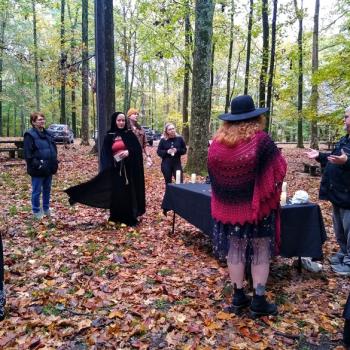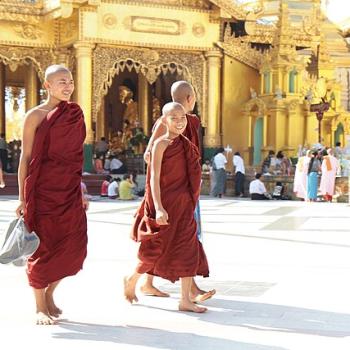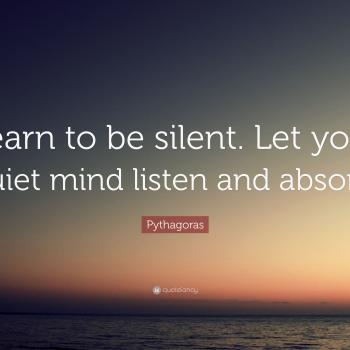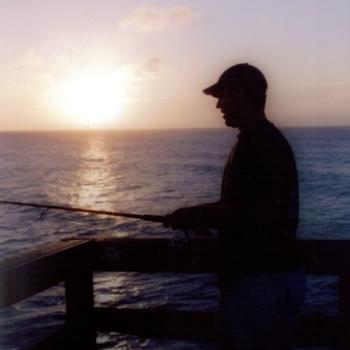It's difficult to refute, I think, that Antinous is one of the most superlatively beautiful deities there has ever been, given that he was a human whose face and figure we have come to know through a profusion of images, and his particular physiological proportions seem to be pleasing to the eyes of people of every gender and sexual orientation. But, one of my earliest experiences of him was not of the usual "pretty boy" image many people might think he has, or even is, based on all of those statues and the ways in which he has been described by poets and devotees over the centuries. An Antinous whose face is contorted into a barbaric battle cry, screaming for justice with cheeks streamed by tears, charging into battle with spear brandished over his head, bloodied and dirtied and wounded, and holding in one hand a severed head that is his own stoic and expressionless face, beautiful but bloodless, and found in some of his extant images and idealized by so many modern and premodern people... this is Antinous the Liberator, the most ferocious and active, transformative and transforming, dynamic and powerful manifestation he has yet taken for me. It is easy to love an Antinous whose hair smells like flowers and whose skin tastes like honey; it's much harder to love an Antinous who is moved to tears and violence at all of the injustices of the world, and even harder still to take up arms and join him, and-if necessary-have one's own injustices of soul rooted out at the tip of his spear. But, that is the liberation that we are called to when Antinous the Liberator approaches.
Or, to take another example from my devotional life, there is Cú Chulainn, the Hound of Ulster. Those who are familiar with his extant myths from medieval Ireland know that few of his sexual encounters (though there were many of those!) are described in even the scantest non-general detail (for the Irish had a bit of a geis when it came to "exposing the secrets of the bed-chamber," which is probably a good rule to follow in general!). But his one-night stand with Úathach is described at some length: it ends when he accidentally breaks her finger and all of her mother Scáthach's men come to rescue her... and, of course, meet their deaths at the Hound's hands. One does not lie down with Cú Chulainn in ignorance that he brings his sword and his spears to bed with him, and he's not afraid to use either or both in the course of a good romp. The same is true when he sits down to eat, when he stops to converse on the road, or when he deals in peace or in wrath with a poet (and since I'm the latter, I know this better than many!). One only needs to know that his foster-brother and lover Fer Diad was slain by him, ultimately because of questions of honor and duty, and his lament over him was more bitter than any uttered in Ireland over any slain warrior to know that for Cú Chulainn, those he loves most are often the ones he hurts the most.
I've wondered why so many people seem to be averse to doing hero-cultus to many Irish heroes, and why Cú Chulainn has not been in higher regard for many polytheists... and perhaps this is why. To be honest, before now, I've never really thought about it, because from my own perspective, Cú Chulainn is no different in this respect than any other god, or any other human for that matter. No one is sweetness and light every moment of the day, much less every moment of their entire life.
I am reminded of something Galina Krasskova said in an online video several years back (which I'm paraphrasing): it's not our job to judge the deities based on their mythologies, it's our job to love them and to serve them. We do not have to emulate their behavior, or even praise it on many occasions (especially if it is unjust), and in some cases we can even critique it. But I don't think we are benefited in any fashion by condemning or slagging off on any deity, hero, or divine ancestor's behavior, in light of the ethics of their original culture or our own.
The natural world and wider cosmos which so many modern Pagans and polytheists worship is beautiful in its ferocity, of colliding asteroids and exploding stars, of lions chasing down and eating gazelles, of spiders being devoured by their own young, just as much as fragrant lotuses on rivers at sunset, groups of male killer whales engaging in pleasurable sexual displays, or the orchestra of the wind through trees on a spring day. As awe-inspiringly and sense-splitting as the sight must have been when Aphrodite rose from the foam of the sea and severed genitals of Ouranos, so too must it have been to have seen Gaia hand Kronos the sickle to do that work. I bow my head, still my mind, and humble my heart before all of these things-as a devotional polytheist, I can do no less.





